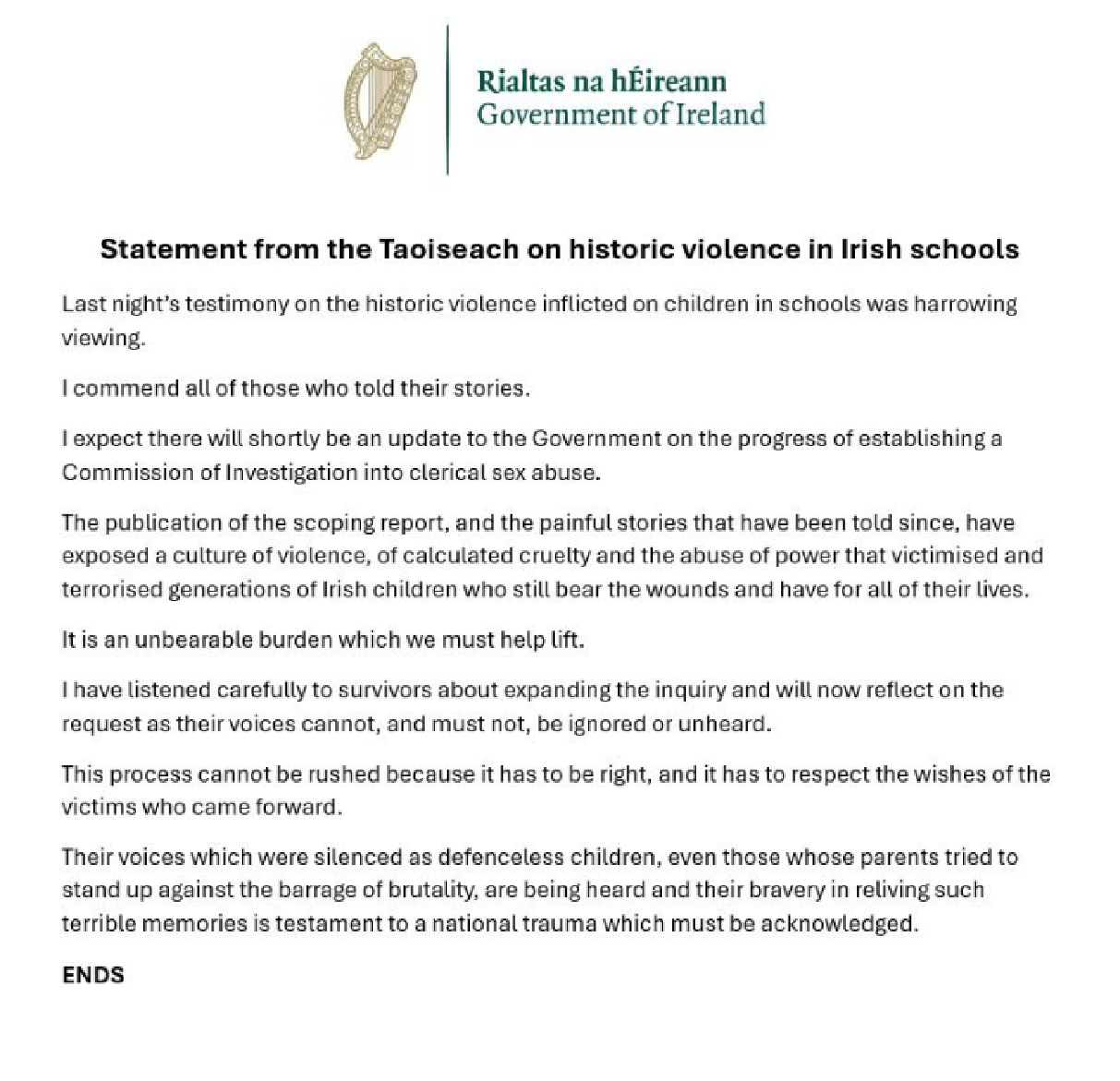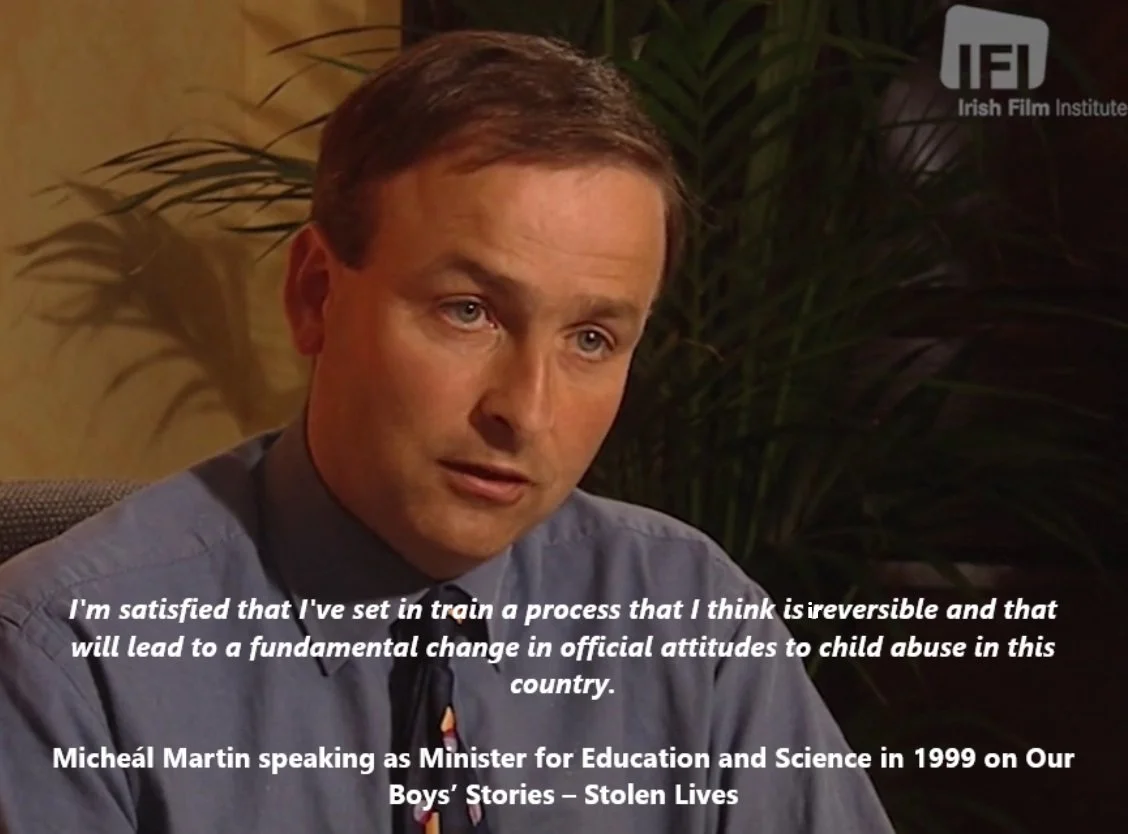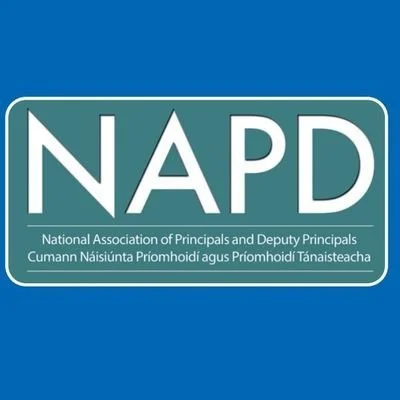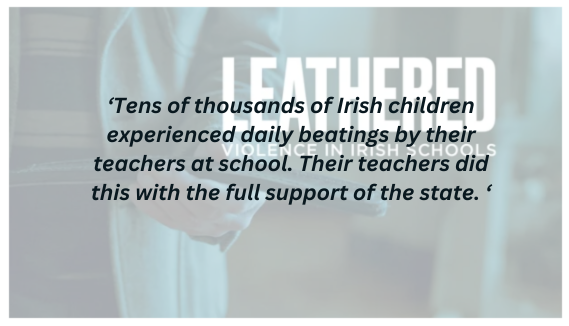It Did Harm
‘A national trauma which must be acknowledged’
Taoiseach Simon Harris TD, 2024
‘As regards physical abuse (in Irish schools), I’m not sure that people realise how bad and how bizarre some of that physical abuse was.’
Padraig O’Morain, The Irish Times
‘I'm satisfied that I've set in train a process that I think is irreversible and that will lead to a fundamental change in official attitudes to child abuse in this country.’
Micheál Martin speaking in 1999 as Minister for Education and Science
The campaign for a state apology to victims of physical abuse in Irish schools before & after the 1982 ban
The culture of denial and trivialisation at the heart of Ireland's attitude to the physical abuse which marked generations of Irish children has to end.
That is the purpose of our campaign.
It is extraordinary how the chill effect of the control mechanisms and myths outlined below are only being shrugged off now in 2024, 40 years after the ban on corporal punishment was implemented! The RTE Radio documentary on the Spiritans abuse in Blackrock, the movie ‘Pray for Our Sinners’ (2022), the RTE documentary ‘Leathered’ have started the process of legitimising and bringing out into the open the agony and shame thousands of children experienced due to their experience of Ireland’s education system.
Why has it taken so long! The chill effect of shame
What has held people back from addressing the abuse they experienced? The myths that deterred many who suffer long term effects of physical abuse from their school years include:
MYTH 1 - ‘Ah shure, we all got a beating, it never did me any harm’
- This cliche is often quoted in discussions about historical abuse in the Irish education system.
The widely repeated ‘social norm’ has two key effects -
CHILL Effect - Attempts to raise the topic as the physical abuse that it was are often boxed off with ‘ah sure that's the way it was then' and that’s that. The thrust of the cliche is similar to World War 2 General Patton’s dismissing PTSD as an ‘excuse for malingering cowards’, that you’re not man or woman enough if you didn’t ‘take the beatings’ and just shrug them off as a ‘rite of passage’ of being a school child in Ireland up to 1997. Because it was the national education system (and their only option for an education) children were quick to learn the coping mechanism of resignation and learned helplessness where victims begin to adopt the perspective of their abusers and rationalise the abuse they experienced through this myth. It joined the other rigid social norm at school of never showing the pain you were experiencing during a beating.
Physical abuse in Ireland’s education system was at such a scale that poems, books, movies and jokes in the pub put it on the level of an Irish trope like the "paddywhackery" stereotypes of the ‘drunk Paddy’ or the ‘fighting Irish’.
SHAME Effect - This leaves the victim carrying the burden of shame. We now know that a significant body of evidence shows that corporal punishment (and much of what Irish school children experienced could not be termed ‘appropriate chastisement’ but in fact physical abuse') causes trauma, which if not treated, can have a lifelong negative impact.
MYTH 2 - It’s all long in the past, it’s a problem for the older generation, not us
- Children only became entirely protected by law from physical abuse in schools in 1997, when the rule of law allowing "physical chastisement" was explicitly abolished. If you were in primary school in the 90’s and experienced, or witnessed, physical abuse then you are in your 40’s now. Equally, trauma is documented as passing along the generations, if a father or mother was traumatised by their school experiences, unless this trauma is treated it is passed to their own children, not as violence but in different ways. Based on the communications received since the RTE Leathered documentary many victims of physical abuse have reached their 60s and never mentioned the physical abuse they experienced at school to anyone, including the person they are married to.
MYTH 3 - Sure didn’t physical abuse in Irish schools all stop when the ban was introduced in 1982, what are you complaining about!
- People who were in primary school in the 80’s and early 90’s share stories of their personal experience of physical abuse in school. It is clear from direct testimonies that violence in some schools only stopped fully as a result of the Offences Against the Person (Non-Fatal) Act 1997, which formally removed any legal defense for corporal punishment under common law, ensuring it could not be used in schools, homes, or other settings.
Untreated trauma from physical abuse by authority figures at school can lead to depression, difficulties with forming relationships, trust issues, alcoholism, drug dependency and in some extreme cases suicide.
MYTH 4 - Sure what’s the point, the Gardai aren’t going to do anything about it.
-In Ireland the Director Of Public Prosecutions, based on evidence in the Garda investigation file, decides whether or not criminal proceedings will be taken or not against a person suspected of historical physical abuse against a child but must do so within the framework of ‘When the allegation was reported’, ‘The passage of time since the alleged incidents’, the burden of ‘beyond reasonable doubt’ on the abused child (now an adult) to prove the abuse happened to them and finally the DPP are required to consider the law as it existed at the time the alleged incidences occurred. Gardai are required to take statements of complaint by any member of the public claiming historical physical abuse when they were at school. What happens as the case file is sent to the DPP often falls foul of Ireland’s highly restrictive Statute of Limitations Act 1957, see more on this below.
A first step towards an Apology to victims of physical abuse in Irish schools
We welcome the public statement by An Taoiseach in November 2024 in the aftermath of the RTE Leathered documentary reproduced below
Ireland’s Education System slowly coming to terms with its past
Apologies/Public Statements from entities manning the Irish education system
In March 2025 we wrote this letter to the entities below, particular those organisations recognised as official Education Partners by the Minister for Education in Ireland. We reproduce their responses where we have received a response.
1. Apology/Public Statement by the Department of Education
Date: Not aware of any to date.*
2. The Christian Brothers apology (1998)
‘We the Christian Brothers in Ireland wish to express our deep regret to anyone who suffered ill-treatment while in our care. And we say to you who have experienced physical or sexual abuse by a Christian Brother and to you who complained of abuse and were not listened to, we are deeply sorry.’
3. Apology/Public Statement by the Irish National Teachers Organisation (Established in 1868)
On 31 October 2024, the INTO made the statement below regarding corporal punishment in the education system.
“The history of education in Ireland, like in many other countries, is not without its darker chapters which we should acknowledge in order to ensure they never occur again. The landmark decision to abolish corporal punishment from the school system in 1982 was, from a child protection perspective, one of the most momentous made here.
Corporal punishment was wrong. It should never have been a feature of our education system.
As a trade union, we are committed to safeguarding the care, dignity, rights and welfare of all pupils and teachers, but we cannot rewrite actions undertaken many decades ago.
I want to express my deep regret that any child found themselves in an education system which allowed the use of corporal punishment and failed to recognise its abhorrence. I also want to acknowledge the lasting effects felt by many Irish citizens who were subjected to corporal punishment in primary schools during the 20th century.” – INTO General Secretary John Boyle
4. Apology/Public Statement by the Association of Secondary Teachers, Ireland (ASTI) (Established in 1909)
18/3/2025
Dear Eoin,
I refer again to your email of 3rd March and your registered letter.
I brought it to the attention of the ASTI Standing Committee at their March monthly meeting.
In the first instance, it was noted that your request regarding motions was received too late for consideration for this year's agenda for Annual Convention, in accordance with our Rules and Constitution.
ASTI abhors and condemns abuse of any kind, particularly when it is directed at vulnerable and defenceless children. The scenes portrayed in the "Leathered" documentary were repulsive. The courage you displayed, with others, in telling your stories was extraordinary. Behaviour of the kind described was wrong, deeply regrettable and leaves a deep scar on the Irish Education system.
We note the position of the then Taoiseach, which you provided, regarding the request to expand the Commission of Investigation into clerical sex abuse to deal with this form of historic violence in schools and we would undertake to assist in any way in the event that such request is facilitated.
Yours sincerely,
Kieran Christie
General Secretary
5. Apology/Public Statement by the Teachers' Union of Ireland (TUI) (Established in 1930)
Date: Not aware of any to date.*
6. Apology/Public Statement by the Irish Primary Principals Network (IPPN) (Established in 1999)
Date: Not aware of any to date.*
7. Apology/Public Statement by the National Association of Principals and Deputy Principals (NAPD) (Established in 1998)
Date: Not aware of any to date.*
8. Apology/Public Statement by the Teaching Council of Ireland (Established in 2006)
Date: Not aware of any to date.*
*Please note that the above is based on internet searches, we are very happy to correct any item above if the relevant organisation has details to show otherwise.
Silence in the face of any form of abuse of power, is itself consent
Question - Was what you experienced within the rules that the teachers were employed under at that time?
Within Irish historical Department of Education guidelines and Irish law, the concept of "appropriate chastisement" for corporal punishment was subject to specific rules and regulations that evolved over time. the Irish Department of Education owed a duty of care to protect children attending schools under its oversight, even before corporal punishment became illegal. The Department issued guidelines intended to regulate corporal punishment in schools. For example, rules stipulated that corporal punishment should only be used as a last resort and in moderation. These regulations implied an acknowledgment of the Department’s responsibility to set standards for child welfare. If schools funded by the Department failed to adhere to guidelines or engaged in excessive corporal punishment, it would be argued that the Department breached its duty by failing to monitor or enforce its regulations adequately.
Responsibility at the level of individual schools - Individual schools funded by the Department of Education, and their Boards of Management, were responsible for ensuring that Department of Education guidelines were adhered to by their teaching staff. The school principal was responsible for day-to-day management of the school and was accountable to the Board of Management and as such the principal had a direct role in ensuring staff adherence to guidelines.
Department of Education 1933 Rules & Regulations
These are the rules that were in effect until the 1982 outright ban.
Rules limited the authority to inflict physical punishment to a specific individual and restricted the type of instrument that could be used and the way in which it could be used.
Department of Education - The Abolition of Corporal Punishment in National Schools - effective 1 February, 1982
All physical punishment banned.
The law should be changed to support victims!
Ireland’s legal framework for addressing historical physical abuse in institutional settings is rooted in the Statute of Limitations 1957, a foundational piece of legislation that establishes time limits for civil claims. While amendments such as the Statute of Limitations (Amendment) Act 2000 have addressed sexual abuse cases, physical abuse remains governed by the original 1957 statute, creating significant barriers for survivors seeking justice decades after their trauma. The Statute of Limitations (Amendment) Act 2000 introduced critical reforms for sexual abuse survivors, recognising psychological disabilities that delay disclosure.
For decades, Ireland’s educational institutions operated under a regime where corporal punishment persisted despite its formal abolition in 1982, shielded by legal frameworks that failed to hold perpetrators accountable. The continued use of physical violence in schools until the criminalisation of corporal punishment in 1997 under the Non-Fatal Offences Against the Person Act left generations of students traumatised. Today, survivors—many now in their 50s and beyond—face systemic barriers to justice due to Ireland’s restrictive statute of limitations, which imposes strict deadlines for filing civil claims or criminal complaints.
This legal framework, designed for ordinary torts and personal injury cases, inadequately addresses the psychological realities of trauma and delayed memory recall among abuse survivors. Reforming these limitations is essential to align Ireland’s legal system with contemporary understandings of trauma, human rights, and restorative justice.
For more see our article by clicking the image below -
Have you been affected?
Many people are not aware of the long term impact of abuse or of witnessing abuse
The questions below arise from research and personal experience, they may or may not relate to your individual circumstances. While these questions address sensitive topics around abuse and trauma, they are intended as general guidance for self-reflection. If you recognize these patterns in yourself, please consider seeking professional support from a qualified mental health practitioner.
‘I’m always fearful, like something bad is going to happen!’
Have you suffered with anxiety, a nameless dread or depression, but been unable to fully understand the cause of it?
— You may be experiencing poor mental health arising from physical abuse at school
‘Everyone let’s me down eventually’
Do you often feel hesitant to trust others, even those you’re close to, because you worry, maybe even subconsciously, they might let you down or hurt you in some way?
— You may be experiencing difficulty forming and maintaining intimate relationships arising from physical abuse at school
‘I feel nothing emotionally, I feel distant to people, even family and friends’
Have you often had feelings of numbness when you wish you felt love or warmth for people, have you had unexpected reactions (such as hostility) to people’s kindness?
— You may be experiencing 'disassociation', a coping mechanism of the mind arising from physical abuse at school
‘I’m useless and stupid, I’m a failure’
Have you had unwelcome, undermining automatic thoughts come into your mind, or automatic urges ‘If I disappeared no-one would miss me!’, are you scared of making mistakes?
— You may be experiencing self loathing arising from physical abuse at school
‘The past is the past, a couple of pints makes me feel better.’
Have you tried to self-medicate or manage feelings of anxiety, depression or anger through excessive drinking or drug taking?
— You may be using alcohol in an attempt to control powerful emotions arising from physical abuse at school
‘If someone hugs me or kisses me part of my mind is sounding the alarm, you’re under threat’
Do you experience unexpected feelings of alarm when people, even loved ones, are in your immediate personal space? Do you prefer to sit with your back to the wall at social events?
— Your body may be misfiring the ‘fight or flight’ response arising from physical abuse at school
Keep in mind that witnessing the physical abuse of a classmate can have as big an impact on you as being directly abused yourself
Resources
Contact Us
Would you like to learn more about our campaign? Then jot your details down in the form and we will be in touch.























